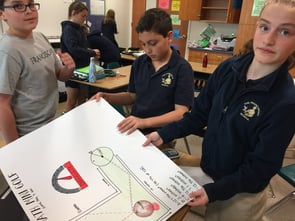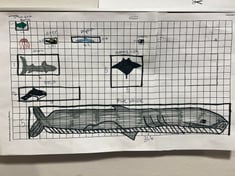“Multiply our kindness and divide away our distractions.” The Franciscan School middle school math teacher Patsy Thieken prays this prayer each day as she immerses her students in the world of math. Math has long been a strong program at TFS, but in recent years, the teachers have focused on how math applies to the world we live in. TFS’s new principal (and former K-5 assistant principal) Dawn Smith says “I encourage all teachers to make the math meaningful and identify and incorporate new and practical life lessons to provide students with a learning environment that is inviting, positive, and most of all, challenging.”
 In the elementary years, students at TFS are provided with foundational mathematical skills and concepts that encourage them to be lifelong learners. This foundation leads students to be prepared for real-life problem solving situations, as well as with the skills necessary to move forward into higher conceptual understanding. Fourth grade teacher Julie Hetu shares that in her classroom, she focuses many of her lessons and units around high cognitive tasks, and she incorporates activities such as escape rooms, pixel art mysteries, and multiplication tic tac toe. All of these activities and games are a fun and interactive way to problem solve and build math fluency in the classroom. Hetu shared that she likes to “tap into the students’ creative sides, embrace student interests, and incorporate innovative ideas into the individualized curriculum.”
In the elementary years, students at TFS are provided with foundational mathematical skills and concepts that encourage them to be lifelong learners. This foundation leads students to be prepared for real-life problem solving situations, as well as with the skills necessary to move forward into higher conceptual understanding. Fourth grade teacher Julie Hetu shares that in her classroom, she focuses many of her lessons and units around high cognitive tasks, and she incorporates activities such as escape rooms, pixel art mysteries, and multiplication tic tac toe. All of these activities and games are a fun and interactive way to problem solve and build math fluency in the classroom. Hetu shared that she likes to “tap into the students’ creative sides, embrace student interests, and incorporate innovative ideas into the individualized curriculum.”
As students enter middle school, the focus shifts slightly to ensure an understanding of math by developing reasoning and mathematical communication skills. This is done by teaching students to make sense of problems and to persevere in solving them. The importance of defending answers using math language and learning from mistakes is also stressed. STREAM is incorporated through technology projects, art designs, and engineering projects. “Science often overlaps with math through use of scientific formulas, graphing, and calculation,” shares Thieken. “At every opportunity, we incorporate activities that require design, execution, redesign, and presentation to further encourage the use of problem solving skills.
 Smith emphasizes that as a whole, it is important for the school to help students to continue developing a growth mindset and appreciation for the learning that comes from making and analyzing mistakes. “By doing the math and finding the value in it,” says Smith, “students can develop greater persistence and skill in handling mathematical challenges.” By promoting reasoning and problem solving, math becomes more applicable and even more enjoyable for the students.
Smith emphasizes that as a whole, it is important for the school to help students to continue developing a growth mindset and appreciation for the learning that comes from making and analyzing mistakes. “By doing the math and finding the value in it,” says Smith, “students can develop greater persistence and skill in handling mathematical challenges.” By promoting reasoning and problem solving, math becomes more applicable and even more enjoyable for the students.
Throughout TFS, teachers continue to incorporate math ideals into everyday learning and growing. Hetu shares this saying that is displayed in her classroom for students to see each day: “Mathematics may not teach us how to add love or minus hate, but it gives us every reason to hope that every problem has a solution.”
Recent Posts
Archives
- September 2019 (4)
- August 2020 (3)
- January 2021 (3)
- August 2021 (3)
- January 2022 (3)
- August 2022 (3)
- January 2023 (3)
- June 2023 (3)
- January 2024 (3)
- May 2024 (3)
- October 2024 (3)
- December 2024 (3)
- October 2019 (2)
- February 2020 (2)
- March 2020 (2)
- April 2020 (2)
- May 2020 (2)
- July 2020 (2)
- September 2020 (2)
- October 2020 (2)
- November 2020 (2)
- December 2020 (2)
- February 2021 (2)
- March 2021 (2)
- April 2021 (2)
- May 2021 (2)
- June 2021 (2)
- July 2021 (2)
- September 2021 (2)
- October 2021 (2)
- November 2021 (2)
- December 2021 (2)
- February 2022 (2)
- March 2022 (2)
- May 2022 (2)
- June 2022 (2)
- July 2022 (2)
- September 2022 (2)
- October 2022 (2)
- November 2022 (2)
- February 2023 (2)
- March 2023 (2)
- April 2023 (2)
- May 2023 (2)
- July 2023 (2)
- August 2023 (2)
- September 2023 (2)
- October 2023 (2)
- November 2023 (2)
- December 2023 (2)
- February 2024 (2)
- March 2024 (2)
- April 2024 (2)
- June 2024 (2)
- July 2024 (2)
- August 2024 (2)
- September 2024 (2)
- January 2025 (2)
- February 2025 (2)
- March 2025 (2)
- July 2019 (1)
- August 2019 (1)
- November 2019 (1)
- December 2019 (1)
- January 2020 (1)
- June 2020 (1)
- April 2022 (1)
- December 2022 (1)
- November 2024 (1)

Leave a Reply